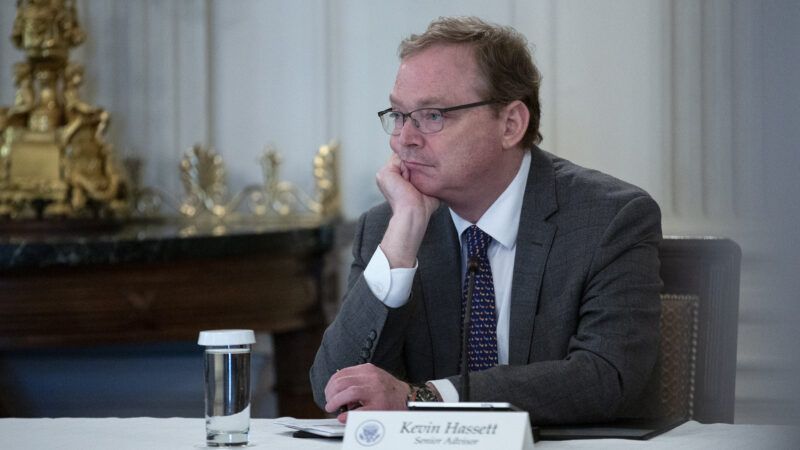This Trump Appointee Could Bring Fiscal Sanity to the White House
"Personnel is policy" has shaped past administrations. Kevin Hassett, who has been tapped to lead the National Economic Council, will have a hand in tax reform, debt reduction, and more.

The fate of President Donald Trump's ambitious economic policy plans will be determined by the people he appoints to critical positions. With a debt of over $36 trillion (heading toward $59 trillion in 2035 by some estimates), inflation not resolved, an entitlement crisis looming, and the need to extend the president's 2017 tax cuts, we'd better hope the cooler, more experienced heads prevail.
As it happens, Kevin Hassett, chair of the Council of Economic Advisers and later a senior adviser to the president during Trump's first administration, has been appointed to lead the National Economic Council. Clearly one of the economists Trump trusts most, Hassett might just be the person capable of charting a fiscally responsible path through challenging circumstances.
"Personnel is policy" is not just a platitude; it's a fact that's shaped past administrations. Key advisers have long played leading roles crafting monumental economic policies.
It's a long list that includes Arthur Laffer, whose theories on tax cuts and supply-side economics fundamentally reshaped fiscal policy and spurred growth during the Reagan years. Ezekiel Emanuel has been called the architect of the Obama administration's Affordable Care Act, with long-lasting impacts on U.S. health care.
Hassett could play an equally significant role. Take the debate about extending Trump's tax cuts. Letting them all expire isn't really an option, but tax cuts are expensive. How to pay is crucial. Unfortunately, in this populist era, corporations are often scapegoated for all that's wrong with the world, and some voices are demanding higher corporate tax rates to pay for individual cuts.
Here, Hassett's scholarship will prove invaluable. In 2006, he and Aparna Mathur coauthored the first empirical study examining the link between corporate taxes and manufacturing wages. Analyzing data from 72 countries over 22 years, they found that the burden of corporate income taxes is largely shouldered by workers through lower wages.
This conclusion has since been reinforced by many studies. In a recent review of the academic literature, Cato Institute economist Adam Michel writes: "The best economic evidence suggests that workers pay more than half, and likely three-quarters, of the cost of the corporate tax. Thus, cutting business taxes is a tax cut for working Americans."
While there are still debates over details, it's now well established that corporate tax cuts aren't simply giveaways to wealthy capitalists. Having someone within the administration who is so authoritative on this issue will be essential if we're to avoid the mistake of paying for some tax extensions with damaging corporate tax hikes.
Indeed, Hassett's work will be important in assessing which expiring tax provisions should absolutely be extended based on an ability to trigger investment, productivity, and economic growth. In that respect, his recent paper on the 2017 corporate tax reforms, coauthored with the Hoover Institution's Jon Hartley and Josh Rauh, demonstrates the importance of restoring the full-expensing provision that is now phasing out. Allowing businesses to fully deduct their investments means productivity, growth, and a more prosperous workforce.
Beyond tax reform work, Hassett has been a key researcher on how best to reduce the debt. In 2010, he and coauthors Andrew Biggs and Matthew Jensen published a paper covering more than 100 instances in which countries tried to reduce budget gaps. Governments which "addressed their budget shortfalls through reduced spending burdens were far more likely to reduce their debt than countries whose budget-balancing strategies depended upon higher taxes."
What's more, "the typical unsuccessful fiscal consolidation consisted of 53 percent tax increases and 47 percent spending cuts. By contrast, the typical successful fiscal consolidation consisted of 85 percent spending cuts."
As Hassett, Biggs, and Jensen made clear, a vast majority of countries that have attempted to reduce debt-to-GDP ratios have failed precisely by relying too heavily on higher tax rates. Considering that the United States needs to implement austerity measures sooner rather than later—it's more a question of "when" than "if"—having someone who understands the importance of carefully designing fiscal adjustments is, once again, essential.
There are many other areas where Hassett could be influential. While he may believe that Trump's tariffs can be used to get concessions from other countries, he understands that, fundamentally, these are taxes imposed on Americans that pave no path to prosperity.
Much attention has been given to Trump's appointees in areas like health care and defense. Hassett's appointment should not be overlooked. It signals a focus on growth, job creation, and even elusive fiscal responsibility—not just short-term populist measures.
COPYRIGHT 2025 CREATORS.COM


Show Comments (32)